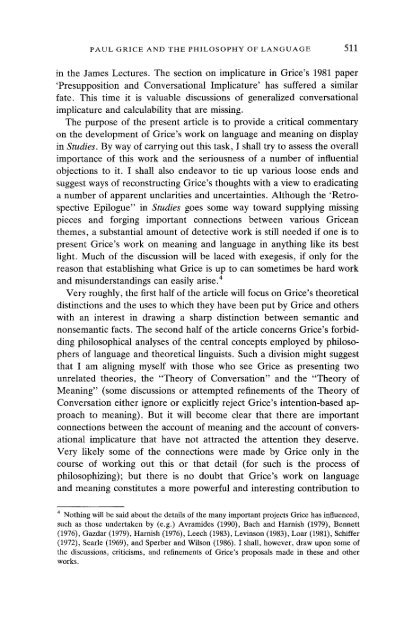Paul Grice and the philosophy of language
Paul Grice and the philosophy of language
Paul Grice and the philosophy of language
You also want an ePaper? Increase the reach of your titles
YUMPU automatically turns print PDFs into web optimized ePapers that Google loves.
PAUL GRICE AND THE PHILOSOPHY OF LANGUAGE 511<br />
in <strong>the</strong> James Lectures. The section on implicature in <strong>Grice</strong>'s 1981 paper<br />
'Presupposition <strong>and</strong> Conversational Implicature' has suffered a similar<br />
fate. This time it is valuable discussions <strong>of</strong> generalized conversational<br />
implicature <strong>and</strong> calculability that are missing.<br />
The purpose <strong>of</strong> <strong>the</strong> present article is to provide a critical commentary<br />
on <strong>the</strong> development <strong>of</strong> <strong>Grice</strong>'s work on <strong>language</strong> <strong>and</strong> meaning on display<br />
in Studies. By way <strong>of</strong> carrying out this task, I shall try to assess <strong>the</strong> overall<br />
importance <strong>of</strong> this work <strong>and</strong> <strong>the</strong> seriousness <strong>of</strong> a number <strong>of</strong> influential<br />
objections to it. I shall also endeavor to tie up various loose ends <strong>and</strong><br />
suggest ways <strong>of</strong> reconstructing <strong>Grice</strong>'s thoughts with a view to eradicating<br />
a number <strong>of</strong> apparent unclarities <strong>and</strong> uncertainties. Although <strong>the</strong> 'Retrospective<br />
Epilogue" in Studies goes some way toward supplying missing<br />
pieces <strong>and</strong> forging important connections between various <strong>Grice</strong>an<br />
<strong>the</strong>mes, a substantial amount <strong>of</strong> detective work is still needed if one is to<br />
present <strong>Grice</strong>'s work on meaning <strong>and</strong> <strong>language</strong> in anything like its best<br />
light. Much <strong>of</strong> <strong>the</strong> discussion will be laced with exegesis, if only for <strong>the</strong><br />
reason that establishing what <strong>Grice</strong> is up to can sometimes be hard work<br />
<strong>and</strong> misunderst<strong>and</strong>ings can easily arise. 4<br />
Very roughly, <strong>the</strong> first half <strong>of</strong> <strong>the</strong> article will focus on <strong>Grice</strong>'s <strong>the</strong>oretical<br />
distinctions <strong>and</strong> <strong>the</strong> uses to which <strong>the</strong>y have been put by <strong>Grice</strong> <strong>and</strong> o<strong>the</strong>rs<br />
with an interest in drawing a sharp distinction between semantic <strong>and</strong><br />
nonsemantic facts. The second half <strong>of</strong> <strong>the</strong> article concerns <strong>Grice</strong>'s forbidding<br />
philosophical analyses <strong>of</strong> <strong>the</strong> central concepts employed by philosophers<br />
<strong>of</strong> <strong>language</strong> <strong>and</strong> <strong>the</strong>oretical linguists. Such a division might suggest<br />
that I am aligning myself with those who see <strong>Grice</strong> as presenting two<br />
unrelated <strong>the</strong>ories, <strong>the</strong> "Theory <strong>of</strong> Conversation" <strong>and</strong> <strong>the</strong> "Theory <strong>of</strong><br />
Meaning" (some discussions or attempted refinements <strong>of</strong> <strong>the</strong> Theory <strong>of</strong><br />
Conversation ei<strong>the</strong>r ignore or explicitly reject <strong>Grice</strong>'s intention-based approach<br />
to meaning). But it will become clear that <strong>the</strong>re are important<br />
connections between <strong>the</strong> account <strong>of</strong> meaning <strong>and</strong> <strong>the</strong> account <strong>of</strong> conversational<br />
implicature that have not attracted <strong>the</strong> attention <strong>the</strong>y deserve.<br />
Very likely some <strong>of</strong> <strong>the</strong> connections were made by <strong>Grice</strong> only in <strong>the</strong><br />
course <strong>of</strong> working out this or that detail (for such is <strong>the</strong> process <strong>of</strong><br />
philosophizing); but <strong>the</strong>re is no doubt that <strong>Grice</strong>'s work on <strong>language</strong><br />
<strong>and</strong> meaning constitutes a more powerful <strong>and</strong> interesting contribution to<br />
4 Nothing will be said about <strong>the</strong> details <strong>of</strong> <strong>the</strong> many important projects <strong>Grice</strong> has influenced,<br />
such as those undertaken by (e.g.) Avramides (1990), Bach <strong>and</strong> Harnish (1979), Bennett<br />
(1976), Gazdar (1979), Harnish (1976), Leech (1983), Levinson (1983), Loar (1981), Schiffer<br />
(1972), Searle (1969), <strong>and</strong> Sperber <strong>and</strong> Wilson (1986). I shall, however, draw upon some <strong>of</strong><br />
<strong>the</strong> discussions, criticisms, <strong>and</strong> refinements <strong>of</strong> <strong>Grice</strong>'s proposals made in <strong>the</strong>se <strong>and</strong> o<strong>the</strong>r<br />
works.














